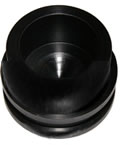
Molded rubber plugs are highly versatile. Like other rubber parts, they don’t rust, nor do they corrode. Therefore, molded rubber plugs last a long time. You can use them to seal holes, finish surfaces and protect components from damage.
What Are Molded Rubber Plugs?
Molded rubber plugs are round plugs consisting of molded rubber. As previously mentioned, they are commonly used to seal holes. Molded rubber is elastic. When placed inside of a hole, it will expand to fill the surrounding space. The end result is a properly sealed hole. Liquids won’t be able to leak out of the hole thanks to the molded rubber plug. In addition to sealing holes, molded rubber plugs are also used to finish surfaces, protect components from damage and more.
How Molded Rubber Plugs Are Made
They are known as “molded rubber plugs” because they are made via a molding process. Molding involves the use of a die to create new parts or objects. The die is filled with a base material, after which it’s allowed to cool. The newly created casting is then ejected and removed from the die.
While all molded rubber plugs are made via a molding process, there are different types of molding processes used to create them. Some molded rubber plugs are made via injection molding. Injection molding is a molding process in which heated material, such as rubber, is injected into a mold cavity.
In addition to injection molding, some molded rubber plugs are made via transfer molding. Transfer molding is a molding process in which the base material is transferred and forced into a mold cavity.
Finally, compression molding is used to create molded rubber plugs. Compression molding is a molding process in which the base material is heated before being pumped into an open mold cavity.
Benefits of Molded Rubber Plugs
When compared to plugs made of other materials, molded rubber plugs offer several benefits. For starters, they are long-lasting. Other plugs may degrade over time. If they are exposed to water or chemicals, for instance, some plugs may crack or otherwise degrade, resulting in premature failure. Molded rubber plugs are resistant to water and chemicals, so you don’t have to worry about them failing prematurely.
Molded rubber plugs support intricate shapes. This is one of the main advantages of molded processes over other manufacturing processes. Manufacturing companies can create complex, intricate rubber plugs using a molding process.
